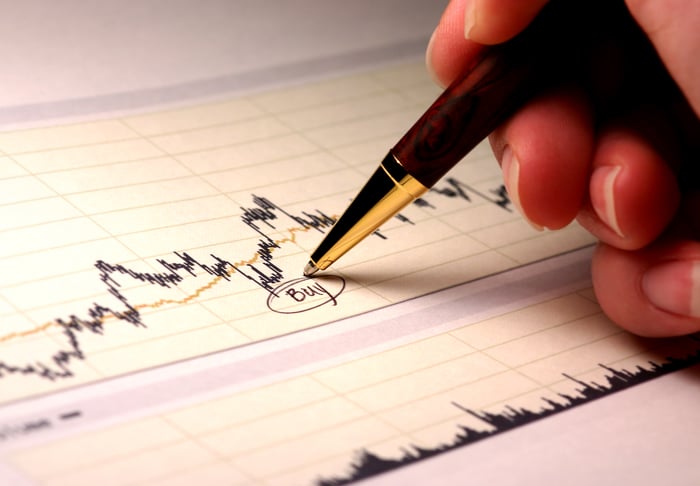The Smartest Stocks to Invest $2,500 Into Right Now
Your pocketbook will thank you if you hang onto these quality companies for the long term.
by Sean Williams (TMFUltraLong)It's a truly trying time to be an investor. Panic and uncertainty caused by the coronavirus disease 2019 (COVID-19) pandemic pushed the broad-based S&P 500 into its fastest bear market in history in March and eventually sent the widely followed stock index down 34% in just 33 calendar days. Never have equities had the rug pulled out from beneath them so quickly.
But at the same time, panic often breeds opportunity when we're talking about investing. Despite never knowing when stock market corrections will present themselves, how long they'll last, or how steep the drop will be, every correction (and bear market) in history has proven to be an excellent buying opportunity for investors with a long-term mindset.
What's more, you don't have to be rolling in dough to put your money to work in the stock market. If you have $2,500 in cash that won't be needed to pay bills or for an emergency, you have more than enough to make a difference. If you have cash to spare, here are some of the smartest stocks you can buy right now.

Berkshire Hathaway
Over the past decade, Berkshire Hathaway (NYSE:BRK.A)(NYSE:BRK.B) CEO Warren Buffett is pretty much par for the course with the benchmark S&P 500. But dating back to 1964, Buffett has more than doubled the annual performance of the S&P 500, inclusive of dividends, and delivered an aggregate return for Berkshire's stock that outpaces the S&P 500 by more than 2,740,000%! In other words, buying Berkshire Hathaway stock makes investing great Warren Buffett your default portfolio manager.
Buying a stake in Berkshire also ties your portfolio to that of the U.S. and global economy. Although recessions are an inevitable part of the economic cycle, the U.S. and global economy tend to spend far more time expanding than they do contracting. Thus, Buffett's historically large bets on traditionally cyclical sectors, such as financials, consumer staples, and information technology, set his company up for success over the long run.
You can also buy Berkshire Hathaway stock at a significant discount. We're talking about a company that's ended each of the past five years at a valuation of 31% to 59% above its book value. Currently trading at 15% above book value, Berkshire is about as inexpensive as we've seen it in a decade. Perhaps this is why Buffett has been busy repurchasing his own common stock of late.

Ping Identity
The coronavirus pandemic hasn't created new trends within certain industries -- it's more like it's accelerated already existing trends. Take cybersecurity, for example, which was a necessity long before COVID-19 hit. However, with more employees working from home, the need to secure the cloud has grown exponentially. That's what makes Ping Identity (NYSE:PING) such a smart cybersecurity/identity verification play.
Why Ping Identity? Arguably the most exciting aspect of this company is its incorporation of artificial intelligence and machine learning to help secure enterprise clouds. Ping's solutions can evolve to spot potentially dangerous situations where a hacker or non-human might be attempting to access important data. In these situations, Ping may require multifactor authentication to confirm the identity of an employee and keep those who are unwanted out of the cloud.
A company like Ping Identity, which is providing a basic-need service in any economic environment, can reasonably grow by 15% to 20% annually, thereby doubling its sales every four years. That's fantastic news considering that the company is already profitable.

CVS Health
Another genius investment to consider is pharmacy-chain giant CVS Health (NYSE:CVS).
As you can imagine, stay-at-home orders throughout much of the U.S. have likely hurt CVS' front-end sales over the past two months. However, it's important to understand that CVS generates razor-thin margins from its front-end products. Rather, this is a story about pharmacy sales and insurer growth.
The great thing about pharmacy sales is that they tend to be consistent. By this I mean that if a person needed heart medication or insulin prior to COVID-19, they're going to continue needing these medications during and after the pandemic.
Furthermore, CVS Health acquired insurance-giant Aetna in 2018, broadening its sales channels and bolstering its organic growth. I suspect 2020 will demonstrate the real cost synergies of combining these two businesses.
And don't forget CVS Health's push toward personalized services. This is a company that's planning to open 1,500 HealthHUB health clinic locations across the country by 2021, which should help funnel additional foot traffic and prescriptions into its stores. Valued at just over eight times next year's earnings, CVS Health is begging to be bought by value-focused long-term investors.

TJX Companies
Discount retailer TJX Companies (NYSE:TJX), which is behind the Marshalls, T.J. Maxx, and HomeGoods brands, is yet another smart way to put your $2,500 to work.
Like most retailers, TJX has been walloped by the coronavirus, with many of its stores shut down for weeks at a time. But as other retailers struggle and try to formulate a plan to survive COVID-19, TJX's business model puts it in prime position to succeed.
TJX's success is derived from its ability to scoop up brand-name merchandise at a discount. Management learned a long time ago that consumers love brand-name merchandise, and they'll buy a lot of it at a perceived discount. TJX should have an absolute field day purchasing merchandise from the growing number of retailers going out of business. Because the company buys in bulk, it's already getting a huge discount, meaning it can pass along a portion of this discount to consumers and still reap significant margins.
What investors are getting with TJX Companies is a retailer that still envisions opening more than 1,500 new stores over the long run (many of them in the U.S.) and has sales-growth potential of nearly 10% a year. It's possibly the cream of the crop among retail stocks.